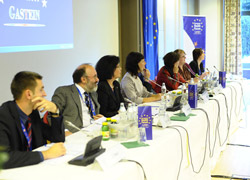Future healthcare models need to incorporate patients
 The current global financial, economic and social crises have resulted in substantial cuts in healthcare budgets. EPF believe that the slashing of health budgets should halt as a knee jerk response to the crisis. The crucial element to be incorporated in future health care models is: the patient.
The current global financial, economic and social crises have resulted in substantial cuts in healthcare budgets. EPF believe that the slashing of health budgets should halt as a knee jerk response to the crisis. The crucial element to be incorporated in future health care models is: the patient.
The 15th edition of the European Health Policy Forum Gastein closes its doors this Saturday. The focus was on “Crisis and Opportunity – Health in a time of Austerity”. This topic is crucial for EPF as the economic crisis and austerity measure are affecting patients and their rights negatively. This ranges from treatment no longer reimbursed, to patients unable to afford their care and turning to clinics run by NGOs, or situations whereby a medical device or medicine is in shortage. We took the opportunity to answer the core question Gastein 2012 addressed of “How health policy and healthcare systems are going to be shaped in the upcoming decades?”
Robert Johnstone, EPF Board Member, set the tone from the very start: “If we are to address the challenge of chronic diseases in a sustainable and effective way, what is truly needed is a fundamental shift in how healthcare is organised and delivered. At EPF, we are convinced that the way forward for this shift is ensuring the patient-centeredness of care. Patient-centred healthcare cannot be achieved without patient empowerment.”
Our President, Anders Olauson, took part in a plenary session entitled “What will European society look like in 2050” and, at the conclusion of the event, he outlined five key avenues of an effective empowerment strategy in order to face the health challenges of 2050. He framed these around the kind of society we want, the values we wish to uphold.
- Promoting health literacy is a key strategy to equip patients with the knowledge and skills needed to take an active role in managing their health and healthcare. Well informed, health - literate patients, are more eager to make better health decisions in all areas of their everyday life, and will enhance productive dialogue between the patient and health professional, leading to better and more cost-effective health outcomes. Targeted health literacy strategies are also needed to reach out to under-represented, disadvantaged groups in our societies in order to empowerment individuals and communities. This was also discussed at a stand-alone session on health literacy at the meeting in which EPF was involved.
- There is a need for an overarching strategy at EU level on information to patients. High quality information on health, diseases, therapy options etc. is a key pillar of patient safety and empowerment, and a key tool to enable meaningful patient involvement in their own healthcare. This means that patients have the skills, information and adequate support to take an active role in the co-management of their disease.
- Patients must be involved in the innovation process, whether for low tech and high tech solutions, to ensure we invest our resources where there is added value and for innovations that take up with the end users. “We need research on models where patients really are at the centre of health and social provision, where they can play a key role through empowerment. The value of innovation should be evaluated for its potential to bring improvements to the quality of services and patients’ quality of life, together with their capacity to change for secondary and tertiary prevention” stated our President.
- An integrated, holistic approach is needed to address multi-morbidity throughout the “patient journey”, involving all the different services and care providers. This process must centre on the person rather than the disease, and the system should empower patients and their families to participate effectively in co-management of the condition.
- The last element is an enabling healthcare environment, whereby the principles of patient-centred healthcare are consistently embedded and applied. For this last point, patient literate healthcare are needed, to ensure they support patients in developing the skills to ask for information, challenge and query. Education of healthcare professionals should include education in self-care in general, and the key competences needed to support patients’ involvement in healthcare.
“We need a 360 degree view, across silos, across disciplines, across budgets or we will quite simply perform under par” concluded Anders Olauson.
In the EPF vision for the the future of healthcare, health care delivery systems, health care professionals and other relevant stakeholders shift dramatically their perspective and no longer consider the patient as being the problem, but consider the patient as a crucial part of the solution.
For more information about the event, please go on the website: www.ehfg.org
